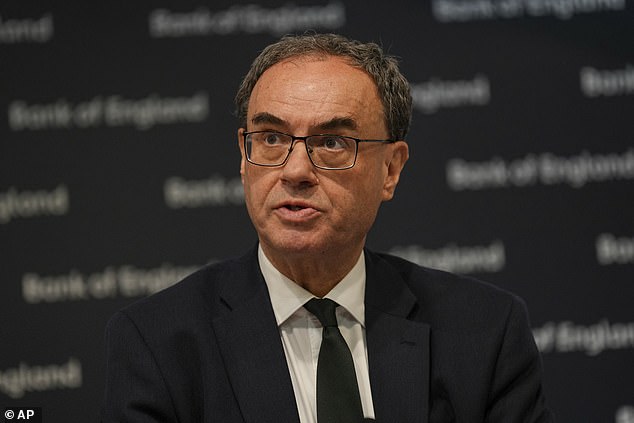A major split opened up at the Bank of England yesterday as rate-setting officials disagreed about how to handle Donald Trump’s trade war.
The Bank’s Monetary Policy Committee (MPC) voted by a narrow 5-4 margin to cut rates from 4.5 per cent to 4.25 per cent.
But the breakdown of the vote showed a three-way split –underlining the depth of the uncertainty facing the Bank as it grapples with the huge uncertainty created by Trump’s tariffs.
Two of the four dissenters voted for a steeper rate cut to 4 per cent, but markets were stunned as two other committee members unexpectedly said they wanted to leave rates on hold.
The splits even spilled over into the Bank’s press conference after the decision, as deputy governor Clare Lombardelli hinted that a rise in trade uncertainty could mean more cuts.
‘Monetary policy makers would respond to those things, as you’d expect, and that would mean by loosening policy,’ she said.

Clash: The Bank of England’s Monetary Policy Committee – led by Governor Andrew Bailey (pictured) voted by a narrow 5-4 margin to cut the base rate from 4.5% to 4.25%
But Governor Andrew Bailey demurred, insisting that officials would also have to consider whether further trade flare-ups could hit supply chains, which might mean looking at ‘the other side of the coin’ at whether they push up inflation.
Traders reversed previous bets that rates will be cut again next month and reduced to 3.5 per cent by the end of the year. Now, a rate of 3.75 per cent looks more likely by the end of 2025.
The pound briefly spiked on the Bank’s announcement, before ending the day on $1.33.
UK borrowing costs also jumped, with yields on ten-year government bonds hitting their highest level in two weeks.
And in stocks, the FTSE 100 reversed some early gains to end 0.3 per cent, or 27.72 points, lower at 8531.61 – the second day in a row of declines after an unprecedented 16-day winning streak.
The rate cut came as US President Trump unveiled an eagerly-anticipated trade deal with the UK.
The outcome provided some relief for Britain’s exporters of cars, aluminium and steel, aerospace and pharmaceuticals from the worst of his barrage of tariffs, but left an across-the-board 10 per cent duty in place.
And the Bank’s decision came a day after the Federal Reserve – the US central bank – left rates in America on hold while also citing heightened levels of uncertainty over tariffs.

The Bank of England predicts that the trade war will knock as much as 0.3 percentage points off UK growth, but acknowledged that the outcome was highly unpredictable.
Threadneedle Street officials were divided over how they need to respond to the trade war in a way that helps them meet their target of bringing inflation down to their 2 per cent target.
Bailey, together with Lombardelli and MPC colleagues Sarah Breeden, Megan Greene and Dave Ramsden all voted for a quarter-point cut.
But there were splits even among that group, with some only persuaded to do so after Trump’s ‘Liberation Day’ tariff announcement last month, while others had been convinced even before then.
Two more dove-ish members, Swati Dhingra and Alan Taylor, argued that inflation pressures were fading and that ‘recent global developments’ pointed to downward pressure on global growth. They voted for a half-percentage point cut.
On the hawkish side, Catherine Mann and Huw Pill argued that persistent inflationary pressures meant that interest rates ought to be left unchanged.
DIY INVESTING PLATFORMS

AJ Bell

AJ Bell
Easy investing and ready-made portfolios

Hargreaves Lansdown

Hargreaves Lansdown
Free fund dealing and investment ideas

interactive investor

interactive investor
Flat-fee investing from £4.99 per month

InvestEngine

InvestEngine
Account and trading fee-free ETF investing
Trading 212
Trading 212
Free share dealing and no account fee
Affiliate links: If you take out a product This is Money may earn a commission. These deals are chosen by our editorial team, as we think they are worth highlighting. This does not affect our editorial independence.
This article was originally published by a www.dailymail.co.uk . Read the Original article here. .

